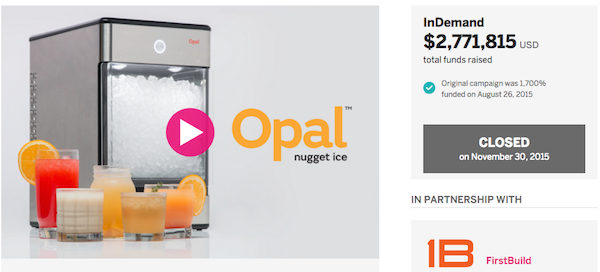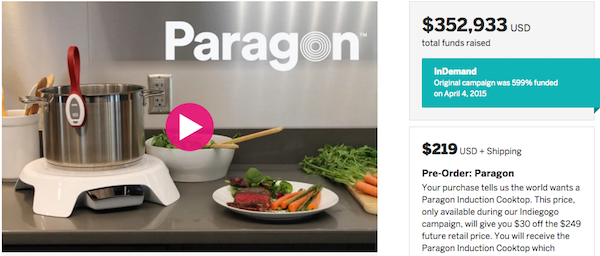On January 6 2016, Indiegogo announced a new enterprise crowdfunding program that gives Fortune 500 companies a better way to test the waters for new and innovative products.
Right now they are working with a handful of companies who are interested in testing consumer interest through pre-orders, including General Electric, Harman International Industries, Hasbro and ShockTop. This new service (which is available for an upfront fee) includes strategy advice, hands on support, promotions and analytics data.
GE has already used this new model for two projects. The first is the Paragon Induction Cooktop, which raised over $350K, as you can see below.
The second is the Opal Nugget Ice Maker, a machine that makes chewable, fast chilling ice like in restaurants. This project raised over $2.7 million – which proved that truly want an affordable way to make nugget ice from home.

Sometimes it can take a long time for out of the box ideas to make it in a big company like GE, which is why Indiegogo is helping larger companies take advantage of crowdfunding to update their product development process. Now that they have proven that there is a demand for this product, GE intends to include the new ice making design in their new refrigerator lines.
“It’s all about accelerating innovation. They lowered their cost to 1/20th the R&D cost and from a four-year cycle of production, it’s now a four-month cycle to be able to come out with a new product,” Indiegogo’s CEO, Slava Rubin, shared at CES.
There were over 110 Indiegogo-funded companies at this year’s CES 2016 (Consumer Electronics Show) in Las Vegas. When they launched in 2008 there were no Indiegogo-funded companies at CES; there also weren’t as many high earning campaigns as there are today. It was considered a lot back then to raise $10K, but now we regularly see projects surpassing $100K or even the million-dollar mark.
With the reveal of this new Indiegogo service a familiar question comes up – should the underdog creators that crowdfunding was initially meant to help be threatened by the presence of these huge companies on the same platform?
Overall, the answer seems to be no. Indiegogo has positioned themselves as a data-driven platform that wants to protect the openness it offers creators, just like YouTube did for videos. That means allowing all projects and creators to have a fair chance (as long as they don’t break the rules).
Unlike their competitor, Kickstarter, Indiegogo is not putting ‘benefit’ ahead of profits. These larger companies are sure to bring more revenue to the platform as more of them adopt this new style of product testing.
Indiegogo’s aim is to help entrepreneurs throughout the whole lifecycle of a project, whether you are a small creator or a large company. They are there to help from the idea stage to distribution, and now they have InDemand – their e-commerce option that allows you to continue to sell on the platform once your crowdfunding campaign is over. With all of these new partnerships, Indiegogo is doing a great job helping crowdfunded products become more ubiquitous in our everyday lives.




